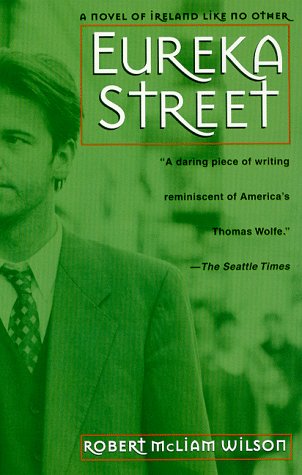It is
undoubted that McLiam Robert Wilson knows how to write well. He manages to
engage you fully in the reading. Unfortunately this has the effect of
transmitting you both positive and negative aspects of what you read. The identification
is such that, when you are told in great detail what happens to the bodies of
the victims of an attack, this bothers you a lot. Similarly, you cannot
disregard certain parts of the story that are not credible, because the
suspension of disbelief does not always work when you have the impression of
being there as well.
All this
cannot but affect the final judgment of a work.
I liked it
a lot the first half of the novel, because I found it fun and light, although
in a tragic background, as if to emphasise the fact that despite the “war”
life, with its small and big problems, continues. I’ve also found amusing the
characterization of Northern Ireland
Then
halfway in the novel there was a real trauma. The detail of the violence
reminded me of scenes from “The Final Destination 3D,” which is not exactly a
merit. This disturbed me a lot and at other times I would probably put the book
aside, because the desire to read had passed.
I
continued, however, and the story is partly returned to the previous tone, but
at the same time increasing the distance between the two main characters:
Chuckie in an incredible escalation goes from loser to famous and on the other
hand Jake that instead follows a more plausible path, but decidedly less
interesting.
The two
sides clash dramatically. In the end, because I read for fun, I liked the most
heartening story of Chuckie, despite its total improbability and despite the
fact that the author left it slyly open at the end, because he had exceeded the
limit and going on would lead to no good.
That of
Jake is instead a story marked from the outset with an absolutely obvious and
banal ending, disguised as a twist.
I also
appreciated the stylistic choice to use two points of view in the narrative,
although the fact of physically separate from one chapter to another, without
adequately specifying it, is a bit confusing, especially in the beginning.
In any case
it was an interesting read, especially for those like me who have been to Belfast
A good
soundtrack of this story would be the song “Take Back the City” by Snow Patrol,
dedicated to Belfast
Eureka Street: A Novel of Ireland Like No Other


No comments:
Post a Comment